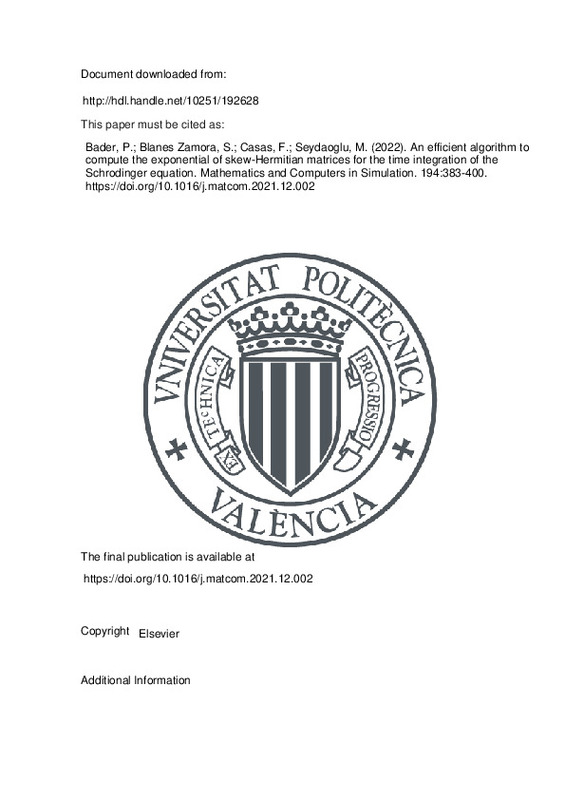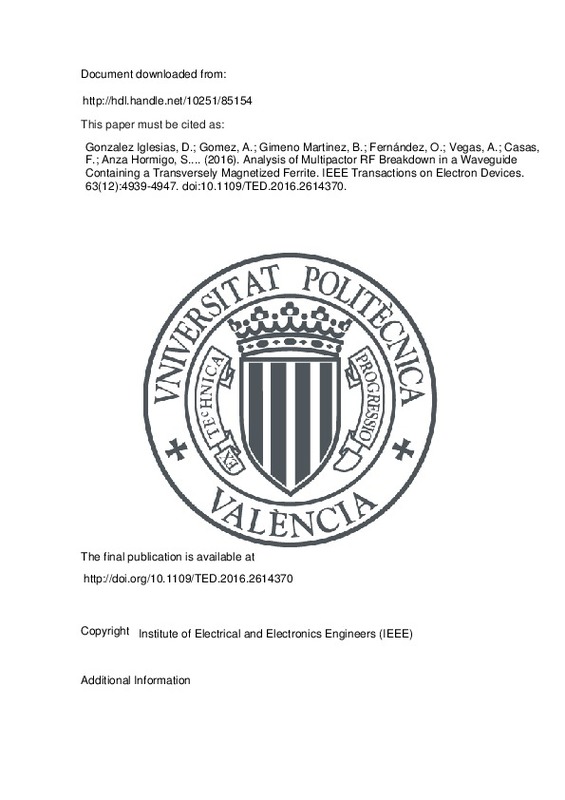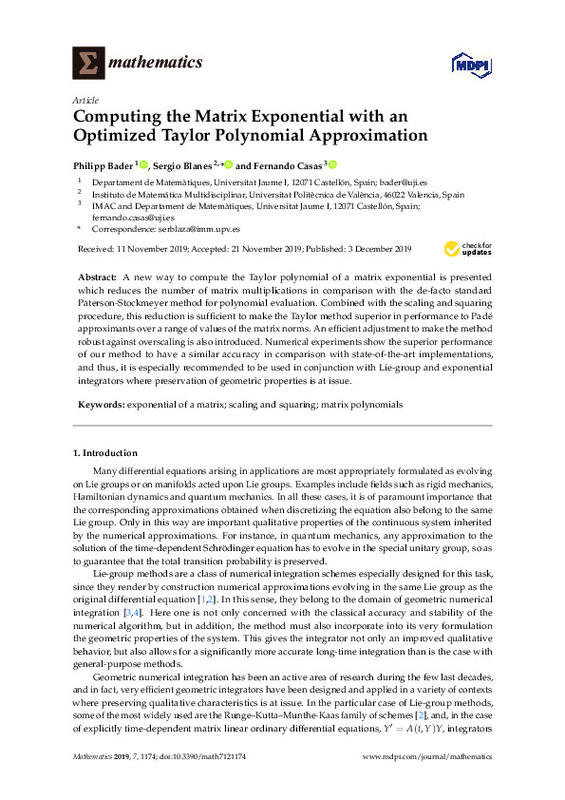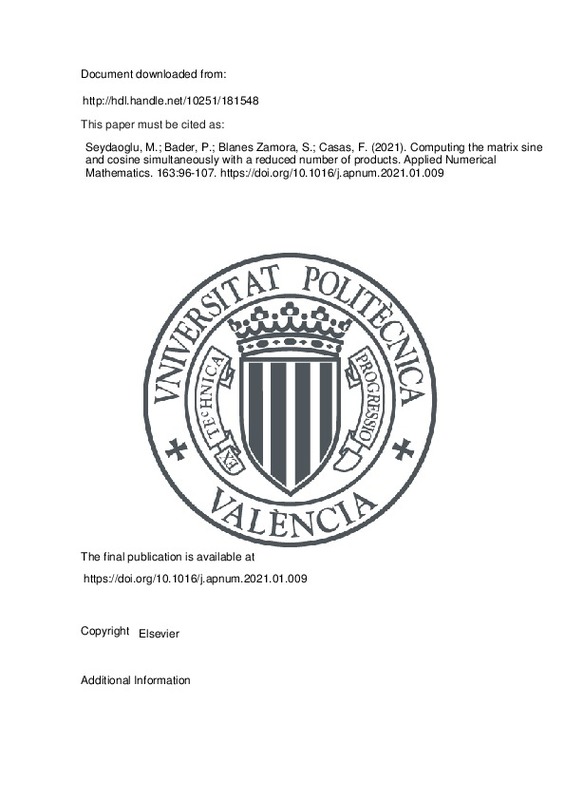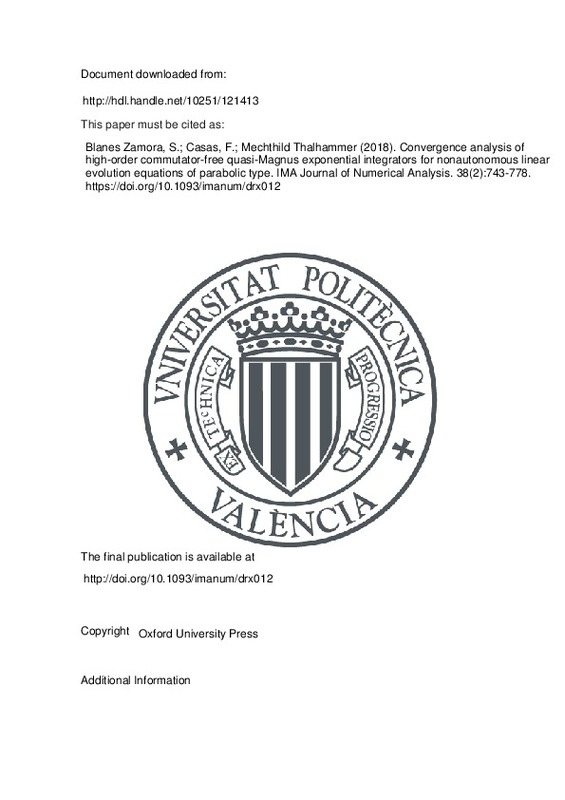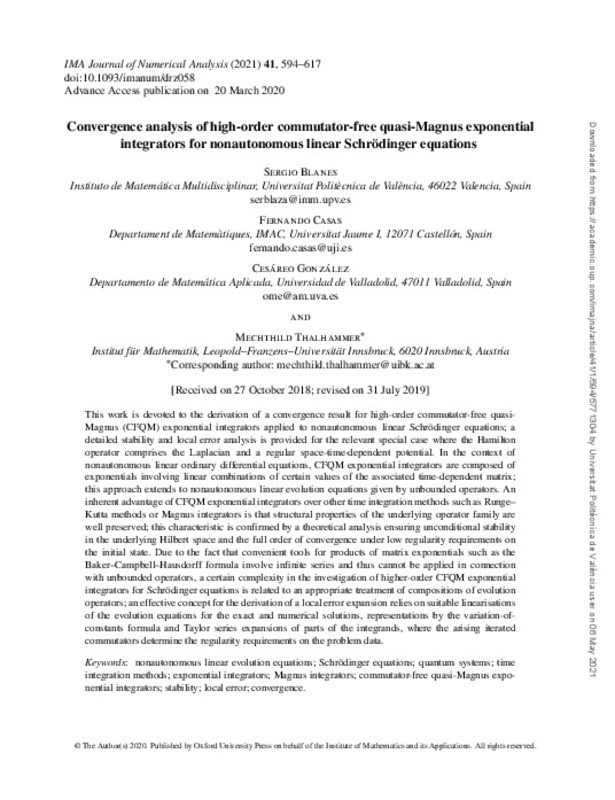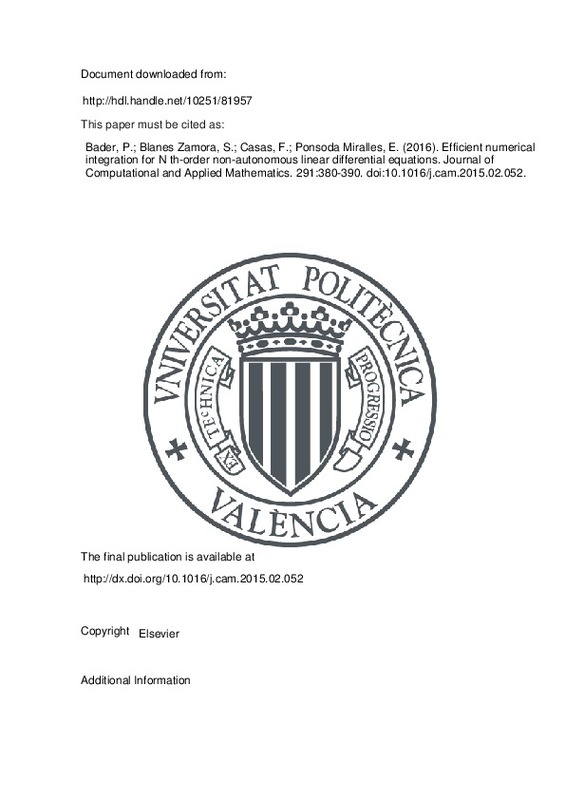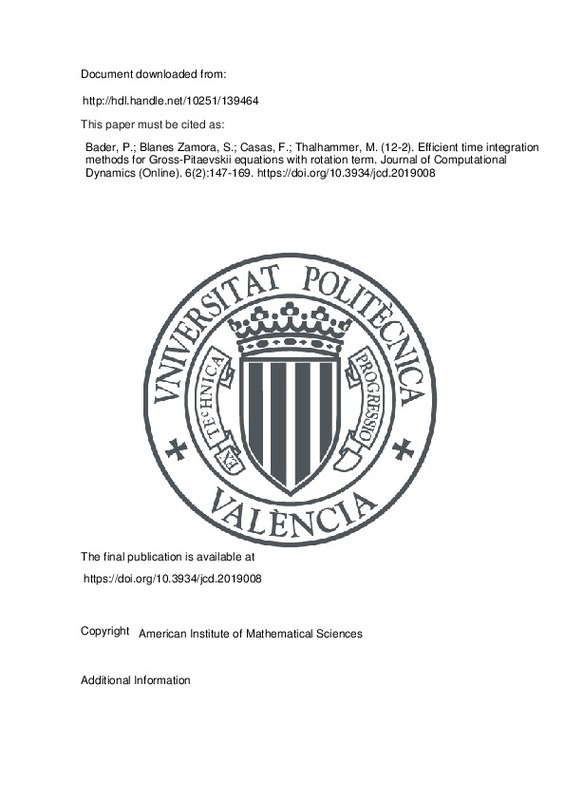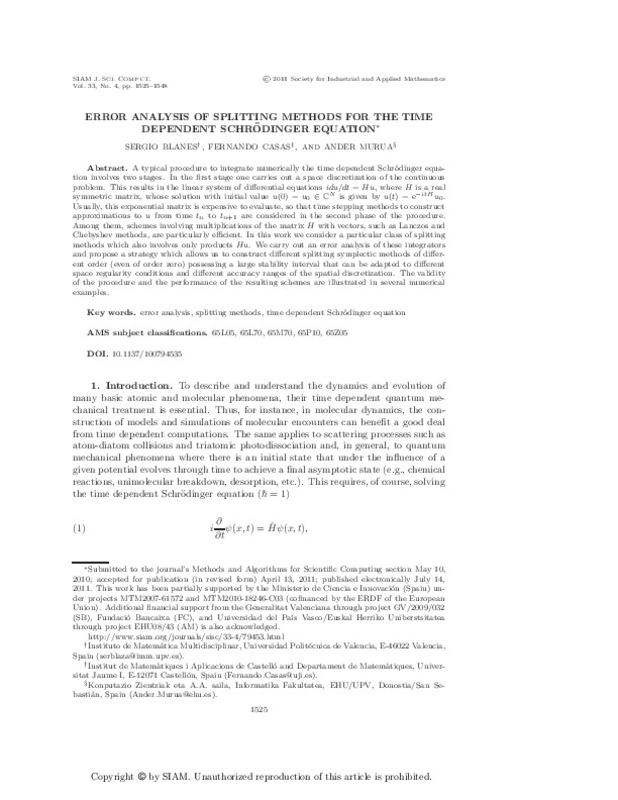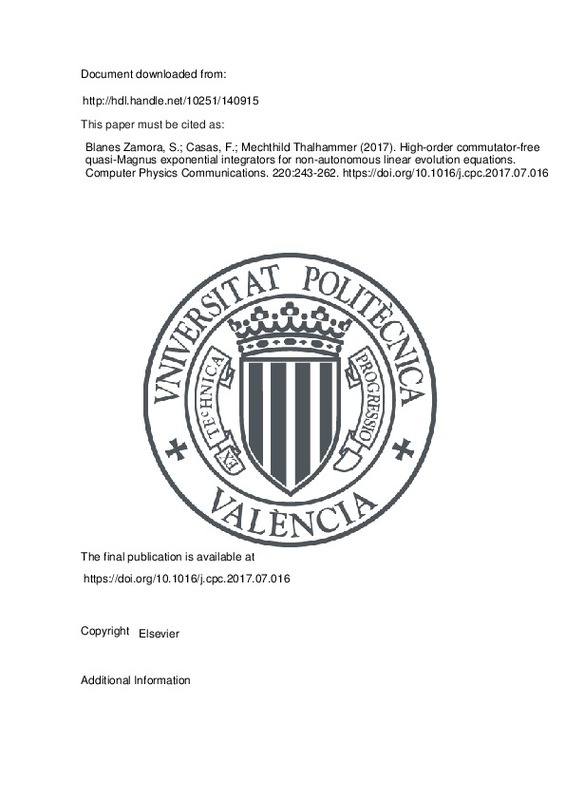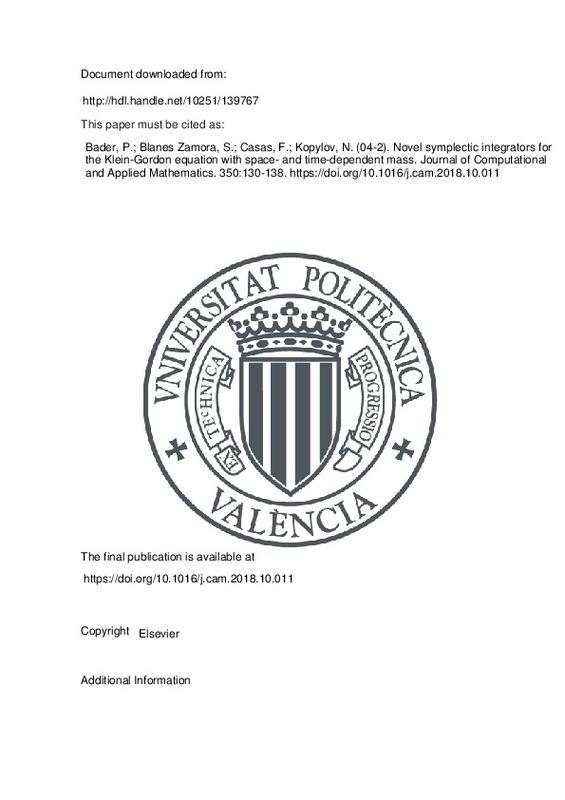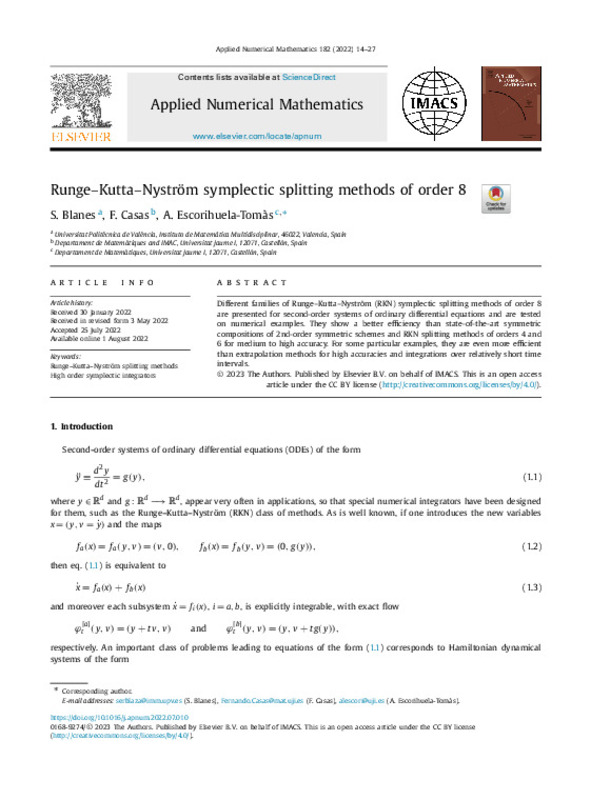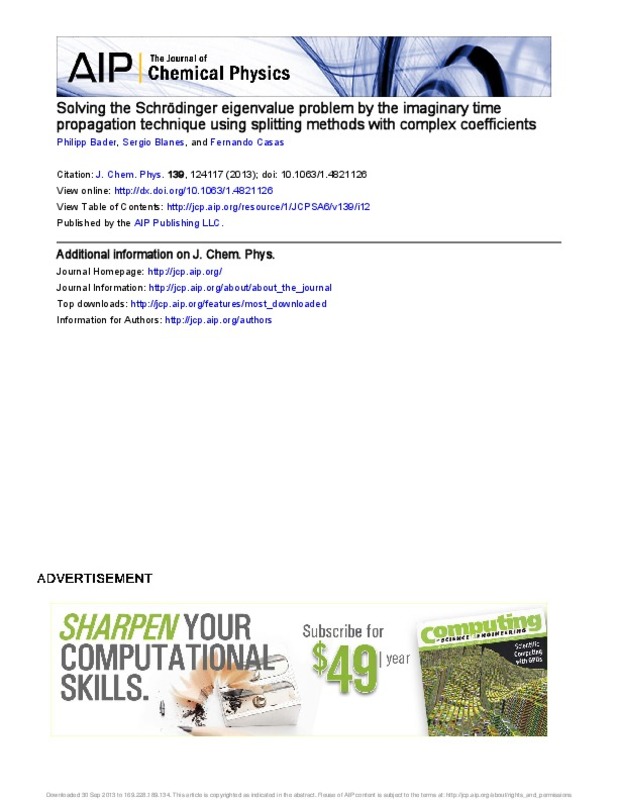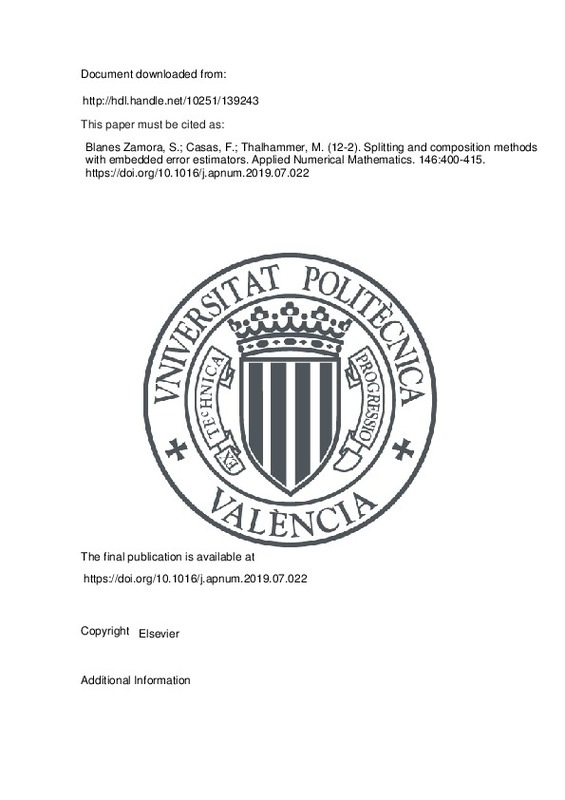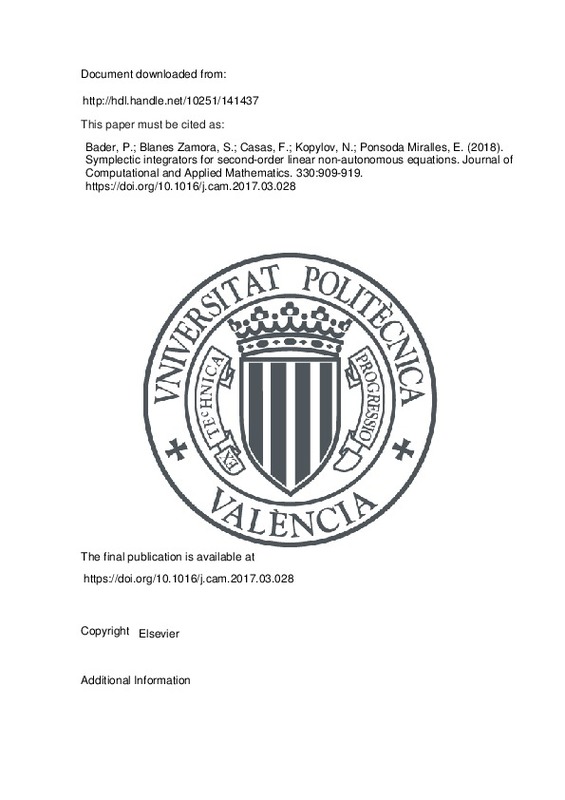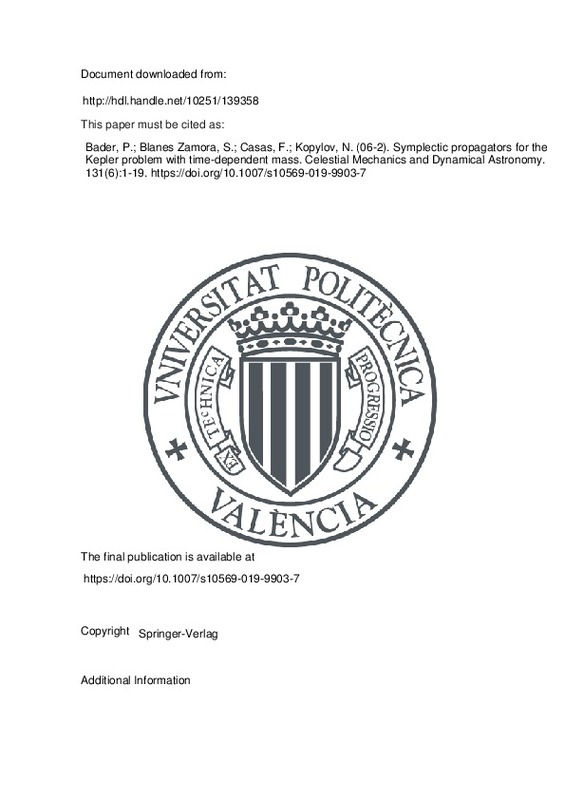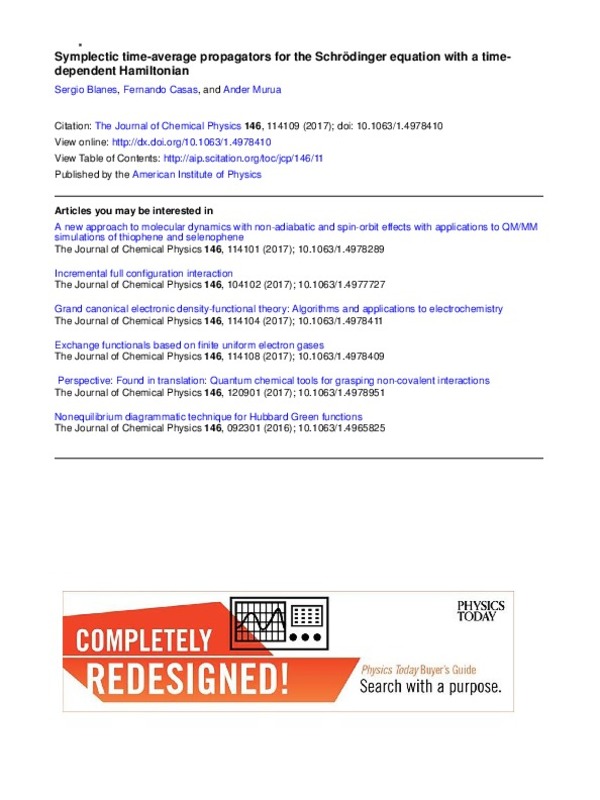

Listar por autor "Casas, Fernando"
RiuNet: Repositorio Institucional de la Universidad Politécnica de Valencia
- RiuNet repositorio UPV
- :
- Listar por autor
JavaScript is disabled for your browser. Some features of this site may not work without it.
Buscar en RiuNet
Listar
Mi cuenta
Ayuda RiuNet
Admin. UPV
Listar por autor "Casas, Fernando"
Mostrando ítems 1-20 de 20
-
Blanes Zamora, Sergio; Casas, Fernando; Murua, Ander (Elsevier, 2015-12-15)We present a practical algorithm based on symplectic splitting methods intended for the numerical integration in time of the Schrödinger equation when the Hamiltonian operator is either time-independent or changes slowly ...
-
Bader, Philipp; Blanes Zamora, Sergio; Casas, Fernando; Seydaoglu, Muaz (Elsevier, 2022-04)[EN] We present a practical algorithm to approximate the exponential of skew-Hermitian matrices up to round-off error based on an efficient computation of Chebyshev polynomials of matrices and the corresponding error ...
-
Gonzalez Iglesias, Daniel; Gomez, Alvaro; Gimeno Martinez, Benito; Fernández, o.; Vegas, A.; Casas, Fernando; Anza Hormigo, Sergio; Vicente Quiles, Carlos Pascual; Gil Raga, Jordi; Mata Sanz, Rafael; Montero, Isabel; Boria Esbert, Vicente Enrique; Raboso García-Baquero, David (Institute of Electrical and Electronics Engineers (IEEE), 2016-12)In this paper, the multipactor RF breakdown in a parallel-plate waveguide partially filled with a ferrite slab magnetized normal to the metallic plates is studied. An external magnetic field is applied along the vertical ...
-
Blanes Zamora, Sergio; Casas, Fernando; Escorihuela-Tomàs, Alejandro (American Institute of Mathematical Sciences, 2022-04)[EN] We explore the applicability of splitting methods involving complex coefficients to solve numerically the time-dependent Schriidinger equation. We prove that a particular class of integrators are conjugate to unitary ...
-
Bader, Philipp; Blanes Zamora, Sergio; Casas, Fernando (MDPI AG, 2019-12)[EN] A new way to compute the Taylor polynomial of a matrix exponential is presented which reduces the number of matrix multiplications in comparison with the de-facto standard Paterson-Stockmeyer method for polynomial ...
-
Seydaoglu, Muaz; Bader, Philipp; Blanes Zamora, Sergio; Casas, Fernando (Elsevier, 2021-05)[EN] A new procedure is presented for computing the matrix cosine and sine simultaneously by means of Taylor polynomial approximations. These are factorized so as to reduce the number of matrix products involved. Two ...
-
Blanes Zamora, Sergio; Casas, Fernando; Mechthild Thalhammer (Oxford University Press, 2018)[EN] The main objective of this work is to provide a stability and error analysis of high-order commutator-free quasi-Magnus (CFQM) exponential integrators. These time integration methods for nonautonomous linear evolution ...
-
Blanes Zamora, Sergio; Casas, Fernando; González, Cesáreo; Thalhammer, Mechthild (Oxford University Press, 2021-01)[EN] This work is devoted to the derivation of a convergence result for high-order commutator-free quasi-Magnus (CFQM) exponential integrators applied to nonautonomous linear Schrodinger equations; a detailed stability and ...
-
Bader, Philipp Karl Heinz; Blanes Zamora, Sergio; Casas, Fernando; Ponsoda Miralles, Enrique (Elsevier, 2016-01-01)We consider the numerical integration of high-order linear non-homogeneous differential equations, written as first order homogeneous linear equations, and using exponential methods. Integrators like Magnus expansions ...
-
Bader, Philipp; Blanes Zamora, Sergio; Casas, Fernando; Thalhammer, Mechthild (American Institute of Mathematical Sciences, 2019-12)[EN] The objective of this work is the introduction and investigation of favourable time integration methods for the Gross-Pitaevskii equation with rotation term. Employing a reformulation in rotating Lagrangian coordinates, ...
-
Blanes Zamora, Sergio; Casas, Fernando; Murua, Ander (Society for Industrial and Applied Mathematics, 2011)A typical procedure to integrate numerically the time dependent Schrodinger equation involves two stages. In the first stage one carries out a space discretization of the continuous problem. This results in the linear ...
-
Blanes Zamora, Sergio; Casas, Fernando; Mechthild Thalhammer (Elsevier, 2017)[EN] The class of commutator-free quasi-Magnus (CFQM) exponential integrators provides a favourable alternative to standard Magnus integrators, in particular for large-scale applications arising in the time integration of ...
-
Bader, Philipp; Blanes Zamora, Sergio; Casas, Fernando; Kopylov, Nikita (Elsevier, 2019-04)[EN] We consider the numerical time-integration of the non-stationary Klein-Gordon equation with position- and time-dependent mass. A novel class of time-averaged symplectic splitting methods involving double commutators ...
-
Blanes Zamora, Sergio; Casas, Fernando; Sanz-Serna, J. M. (Society for Industrial and Applied Mathematics, 2014)We construct numerical integrators for Hamiltonian problems that may advantageously replace the standard Verlet time-stepper within Hybrid Monte Carlo and related simulations. Past attempts have often aimed at boosting the ...
-
Blanes Zamora, Sergio; Casas, Fernando; Escorihuela-Tomàs, Alejandro (Elsevier, 2022-12)[EN] Different families of Runge-Kutta-Nyström (RKN) symplectic splitting methods of order 8 are presented for second-order systems of ordinary differential equations and are tested on numerical examples. They show a better ...
-
Bader, Philipp; Blanes Zamora, Sergio; Casas, Fernando (American Institute of Physics (AIP), 2013-09-28)The Schrodinger eigenvalue problem is solved with the imaginary time propagation technique. The separability of the Hamiltonian makes the problem suitable for the application of splitting methods. High order fractional ...
-
Blanes Zamora, Sergio; Casas, Fernando; Thalhammer, Mechthild (Elsevier, 2019-12)[EN] We propose new local error estimators for splitting and composition methods. They are based on the construction of lower order schemes obtained at each step as a linear combination of the intermediate stages of the ...
-
Bader, Philipp; Blanes Zamora, Sergio; Casas, Fernando; Kopylov, Nikita; Ponsoda Miralles, Enrique (Elsevier, 2018)[EN] Two families of symplectic methods specially designed for second-order time-dependent linear systems are presented. Both are obtained from the Magnus expansion of the corresponding first-order equation, but otherwise ...
-
Bader, Philipp; Blanes Zamora, Sergio; Casas, Fernando; Kopylov, Nikita (Springer-Verlag, 2019-06)[EN] New numerical integrators specifically designed for solving the two-body gravitational problem with a time-varying mass are presented. They can be seen as a generalization of commutator-free quasi-Magnus exponential ...
-
Symplectic time-average propagators for the Schrodinger equation with a time-dependent Hamiltonian Blanes Zamora, Sergio; Casas, Fernando; Murua, Ander (American Institute of Physics, 2017-03-21)[EN] Several symplectic splitting methods of orders four and six are presented for the step-by-step time numerical integration of the Schrodinger equation when the Hamiltonian is a general explicitly time-dependent real ...
Mostrando ítems 1-20 de 20

Universitat Politècnica de València. Unidad de Documentación Científica de la Biblioteca (+34) 96 387 70 85 · RiuNet@bib.upv.es



